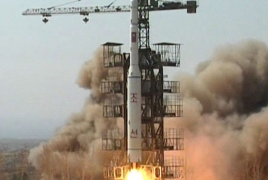U.S., Japan “collaborating on new missile defense radars” May 23, 2017 - 10:13 AMT PanARMENIAN.Net - Raytheon Co and Lockheed Martin Corp are working with Japanese partners on rival projects to develop new radars that will enhance Japan's shield against any North Korean missile strike, government and defense industry sources in Tokyo told Reuters. As nuclear-armed Pyongyang builds ever more advanced missiles with the ability to strike anywhere in Japan, Tokyo is likely to fund a ground version of the ship-based Aegis defense system deployed on warships in the Sea of Japan, other sources had said earlier. Raytheon is allied with Mitsubishi Electric Corp on the project while Lockheed is working with Fujitsu Ltd. The intent is to extend the range of Japan's detection and targeting radars multiple times beyond range of models currently deployed at sea, the five government and industry sources said. "Japan's government is very interested in acquiring this capability," said one of the sources with knowledge of the radar plans. The sources asked not to be identified because they were not authorized to speak to the media. "Japan wants to have Aegis Ashore operational by 2023 at the latest," said another of the sources. Lockheed Martin, Raytheon and Mitsubishi Electric declined comment, while Fujitsu did not respond to requests for comment. A spokesman for Japan's Ministry of Defense said Tokyo did not currently have any concrete plans to collaborate with the United States on Aegis radars. "It is not our place to discuss the activities of corporations," the spokesman added. The proposed Aegis Ashore radars would be variants of models already developed by Raytheon and Lockheed, the sources said. They would include components using gallium nitride, an advanced material fabricated separately by Mitsubishi Electric and Fujitsu that can amplify power far more efficiently than conventional silicon-based semiconductors. Nuclear-capable North Korea has a fast accelerating missile development program and Japanese officials have been worried that its ballistic missile defenses (BMD) could be overwhelmed by swarm attacks or be circumvented by warheads launched on lofted trajectories. In the latest snub to demands it end its weapons program, North Korea on Sunday fired what it described as a intermediate-range ballistic missile that flew about 500 km (311 miles), falling into waters off its east coast. It had tested another missile the previous Sunday. North Korea said that launch tested the capability to carry a "large-size heavy nuclear warhead" and put the U.S. mainland within "sighting range." Japan would likely need three Aegis Ashore batteries to cover the whole country, each of which would cost around $700 million without missiles, one of the sources said. Photo: AP Authorities said a total of 192 Azerbaijani troops were killed and 511 were wounded during Azerbaijan’s offensive. In 2023, the Azerbaijani government will increase the country’s defense budget by more than 1.1 billion manats ($650 million). The bill, published on Monday, is designed to "eliminate the shortcomings of an unreasonably broad interpretation of the key concept of "compatriot". The earthquake caused a temporary blackout, damaged many buildings and closed a number of rural roads. Partner news |